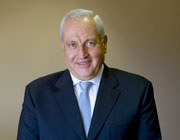Lebanese businessman Said Fayez Khalaf renews his commitment to LAU students

Alongside playing a leading role in one of Nigeria’s largest construction companies, prominent Lebanese businessman Said Fayez Khalaf, who comes from the southern Lebanese town of Khiam, has been finding time to contribute to growth and development in more philanthropic fields. Since 2008, Khalaf, chief executive of Setraco-Nigeria Limited, has supported several scholarships at the Lebanese American University.
Khalaf’s initial series of donations to LAU were directed at students pursuing Masters Degrees in International Relations. On one hand, Khalaf is committed to furthering knowledge in this discipline because he believes it will enhance civic and social responsibility. “A broader understanding of history and international relations on both a macro and micro scale will result in more rounded individuals and professionals,” says Khalaf.
On the other hand, Khalaf chose to support the study of International Relations over other subjects for a deeply personal reason: in 2002, Khalaf’s son, Nadim, then a student in International Relations at Boston College, suddenly passed away at the tender age of 24. In his memory, the Nadim Said Khalaf Endowment Scholarship Fund was established alongside the Nadim Said Khalaf Annual Scholarship Grant in order to provide financial assistance to International Relations postgraduates at LAU. Khalaf’s combined donations to both funds have reached a quarter-million dollars.
Recently, Khalaf decided to diversify his commitment to furthering education at LAU. While continuing his support to International Relations students, he is encouraging a new generation of Lebanese engineers by offering financial support paralleled with offers for future employment. Thanks to Khalaf’s support, two lucky Engineering students will have their tuition fees at LAU covered for a four-year period and, upon graduation, will be offered jobs in one of Khalaf’s companies. Two full Engineering scholarships at LAU are now estimated at over $140,000.
As Khalil Jabbour, an LAU Engineering alumnus currently working for one of Khalaf’s companies in Nigeria, put it: “In Nigeria, I’m able to save money and within one year and a half, I was able to establish a new career and a new lifestyle; for instance I was finally able to pay a down-payment for an apartment”. Another LAU graduate who has been hired by Khalaf as project manager for a 420m long pre-stressed bridge in Ondo, West of Nigeria is Raed Saliba, who also highly recommends working in Nigeria to fresh graduates, saying: “Life is not so demanding and you can save some money. As for work you can develop your career to a great extent. You surely learn something important from this experience”.
LAU is not the only academic institution to benefit from Khalaf’s generosity: students at other Lebanese universities have received financial assistance on a case-to-case basis and Khalaf’s companies have established scholarship funds for excelling and underprivileged Nigerian students as well. Nevertheless, the educational vision of LAU’s leadership and its decision to open a second campus in Byblos, which Khalaf describes as “the ancient cradle of international relations in Lebanon”, have led to Khalaf holding LAU in particularly high esteem and explain his decision to continue supporting the university.
Khalaf’s renewed pledge to LAU and to students in different academic fields illustrates his longstanding commitment to education and growth. “I hope,” says the dynamic businessman, “that the donation will have a positive effect on producing a group of free thinking young Lebanese professionals and entrepreneurs of the future.”

